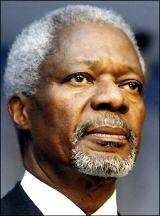Annan seeks Western air cover for AU forces in Darfur – WP
By Colum Lynch
Mar 3, 2006 (WASHINGTON) — Secretary General Kofi Annan told the United States that U.N. members should consider providing close air support in possible combat situations for several thousand African Union peacekeeping troops in the Darfur region of Sudan.
 The request, in a confidential letter to John R. Bolton, the U.S. ambassador to the United Nations, shows that the world body is pressing for a more aggressive military approach in dealing with armed groups in Darfur, and that it wants the United States and other Western powers to participate in that effort.
The request, in a confidential letter to John R. Bolton, the U.S. ambassador to the United Nations, shows that the world body is pressing for a more aggressive military approach in dealing with armed groups in Darfur, and that it wants the United States and other Western powers to participate in that effort.
“Given the continued and serious deterioration in the security situation in Darfur, the support to AMIS should perhaps include the provision of new and additional capabilities, including close air support,” Annan wrote Bolton, referring to the African Union Mission in Sudan. “I would be grateful if governments in a position to provide such capabilities at short notice could consider this possibility.”
Annan’s initiative is part of an evolving U.N. strategy to bolster the African Union troops’ ability to restrain armed groups and halt violence against civilians as the world body prepares for a lengthy transition to a U.N. peacekeeping force. The United Nations is also requesting that governments with advanced militaries supply the African troops with sophisticated logistical and intelligence support and aircraft for ferrying troops around the province.
The violence in Sudan began in early 2003, when two Darfurian rebel groups took up arms against Sudan’s Islamic government, citing discrimination against the region’s primarily black tribes. Khartoum responded by recruiting, arming and supporting local Arab militia, known as the Janjaweed, as they targeted villages suspected of sympathizing with the rebels. As many as 200,000 people have since died in Darfur as a result of violence and disease, and more than 2 million have been driven from their homes, including thousands that crossed the border into Chad, according to U.N. estimates.
A force of more than 7,000 African Union peacekeepers has been seeking, with limited success, to restore calm to Darfur. President Bush last month called for doubling the number of international troops in the war-ravaged Darfur region of Sudan and for a bigger role for NATO in the peacekeeping effort. Bush has concluded that peace talks will not stop the violence and that a more muscular military response is needed.
The Bush administration has sent four military planners to New York to help the United Nations plan for the transition. U.S. officials say the military will likely airlift troops to Darfur and provide the mission with logistical and intelligence support.
But U.S. officials have been cool about a potential U.S. combat role in Sudan, noting that the nation has major military responsibilities in Afghanistan and Iraq. Officials note that there are many other governments that have can provide close air support, which involves the use of attack helicopters or planes in support of ground troops.
Bolton said in an interview Thursday that he did not consider Annan’s letter an “explicit” request for U.S. air power, and he said it was too early to determine the U.S. role in Darfur until the U.S. and U.N. military planners provide the Security Council with options. “What decision the United States might or might not make down the line — it’s entirely premature to even speculate on that,” he said.
One U.S. military official involved with Africa said the Pentagon is considering ways to assist in Darfur but that the African Union would have to remain in the lead for now. “No final decisions have been made,” the official said.
The official said the administration and the United Nations are in discussions about enforcing a U.N. ban on flights by the Sudanese aircraft that have been used in attacks on villages and rebels in Darfur. “What’s been talked about is imposing a no-fly zone,” he said.
Senior U.N. officials are hopeful that they can persuade Bush to order the Pentagon to commit airpower to the mission or to at least persuade other military powers to pitch in.
The effort to strengthen the international peacekeeping role in Darfur, meanwhile, suffered a setback this week as Sudan stepped up a diplomatic campaign to bar U.N. peacekeepers from deploying in Sudan. The African Union, which is meeting in Darfur on March 10, signaled it may renege on a previous commitment to turn over authority to the United Nations, Jan Pronk, the U.N. special envoy to Sudan, told reporters this week.
“The government is taking a very strong position against a transition to the U.N., and that is new,” Pronk said. “Sudan has sent delegations to many countries in the world in order to plead its case.”
Bolton, meanwhile, has distributed a paper to council members with elements for a Security Council resolution authorizing a new U.N. mission. The paper calls for the protection of civilians under threat and for the enforcement of a ban on offensive air flights by the Sudanese air force over Darfur. It would also provide authority to carry out preemptive strikes against groups that pose a threat.
(The Washington Post)
